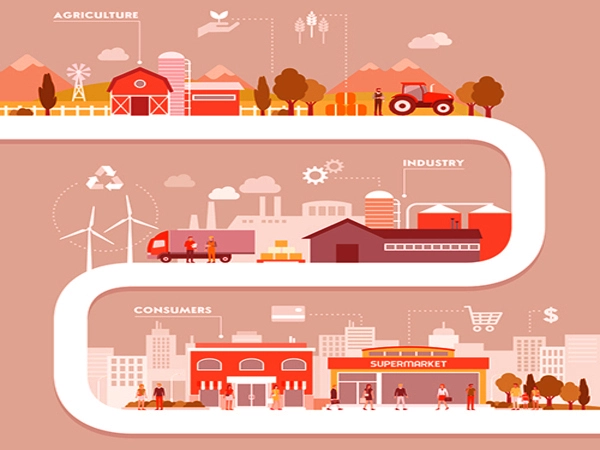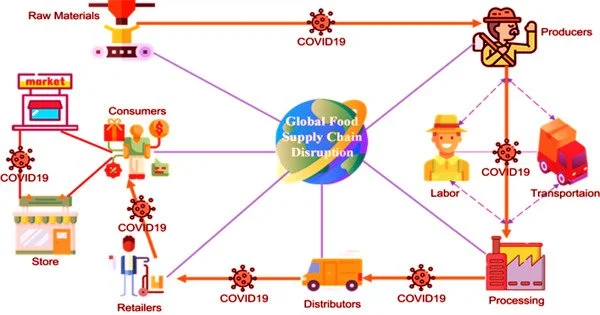A new study investigates the impact of trade and centrality in the global wheat trade network on food security. According to the study, many countries rely on trade to meet their food needs. Furthermore, the global wheat trade is concentrated in a few countries, so disruption in just a few countries could have global consequences, according to researchers.
Food availability has been highlighted as a global vulnerability as a result of the pandemic and war in Ukraine. While international trade allows countries to compensate for domestic food shortages and gain access to larger markets, what happens when supplies run low or the global supply chain slows or even breaks down, as it did during the pandemic?
A new study from the University of California, Davis sheds light on the impact of trade and centrality in the global wheat trade network on food security. According to the study, many countries rely on trade to meet their food needs. Furthermore, the global wheat trade is concentrated in a few countries, so disruption in just a few countries could have global consequences, according to researchers.
The study was published in the journal PLOS ONE under the title “Connected and Extracted: Understanding how centrality in the global wheat supply chain affects global hunger using a network approach.”
When you look at the global wheat trade, you can see historical patterns of wealth accumulation through colonization and the slave trade. Many European countries with limited agricultural lands find themselves at the heart of the global wheat supply chain, owing to trade agreements and trade patterns forged during their colonial past.
Subhashni Raj
The study’s authors include Subhashni Raj, assistant professor, Department of Urban and Regional Planning, University of Hawaii-Manoa, who was a UC Davis postdoctoral scholar when the study was written; Catherine Brinkley, associate professor, Department of Human Ecology, UC Davis; and John Ulimwengu, senior research fellow, International Food Policy Research Institute.
The current baby formula shortage and concerns about global grain supplies are now at the forefront of global trade concerns. “Wheat, maize, and rice account for more than half of human caloric consumption and are critical to global food security. With the conflict between Russia and Ukraine’s breadbasket, there is widespread concern about food shortages “Brinkley, the study’s co-author, stated
“For example, the war in Ukraine, combined with supply chain issues, has contributed to price increases in cereal grains and food prices globally, but particularly in the Global South, where countries rely on cereal imports,” Raj added. This region includes Africa, Latin America and the Caribbean, the Pacific Islands, and developing Asian countries, including the Middle East.

Having more land doesn’t mean more food
Furthermore, researchers discovered that having more agricultural land does not always equate to higher levels of national nutrition. “One would think that having a lot of farmland would help buffer against hunger,” said Brinkley. “Yet, agriculturally rich areas of the world are frequently literal battlegrounds for resource control.”
According to the researchers, food resources are frequently plugged into the vast globalized food chain with little to no positive impact on communities where the chain began, undermining the food security of their own people in order to leverage the country’s advantage in the international food economy.
Given their purchasing power and proximity to important wheat trade hubs, countries in the Global North with low production capacities control a significant share of that supply chain. “When you look at the global wheat trade, you can see historical patterns of wealth accumulation through colonization and the slave trade. Many European countries with limited agricultural lands find themselves at the heart of the global wheat supply chain, owing to trade agreements and trade patterns forged during their colonial past” Raj explained.
Researchers used international wheat trade data to reconstruct the global trade network and identify the most influential countries. They found that countries most central to the global grain trade account for more than half of all wheat exports globally by volume: Germany, Italy, France, Turkey, Russia, the United States and Canada.
As a result, a shock to one of these countries is likely to spread throughout the global wheat value chain. “That is the curse of working in a food system where all components, large and small, are interconnected,” Brinkley explained.
Researchers called for more emphasis on regional and localized food systems in their study to correct the unbalanced structure of the trade network, because well-functioning local food systems more effectively counter shortfalls and perturbations in the larger globalized food system.
















